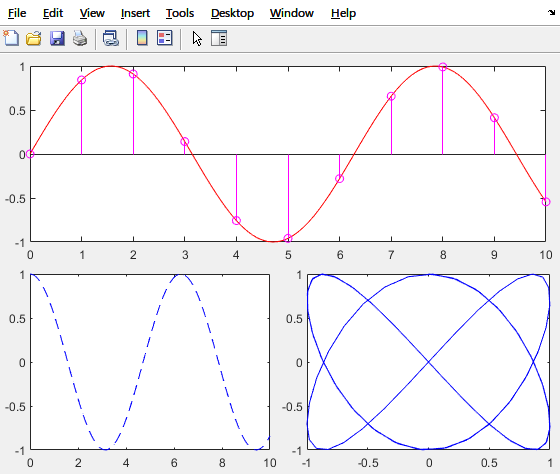matlab subplot 的边距(with tight margins)
matlab subplot的边距问题
在matlab中使用subplot画出的图像的边距比较,因此,不管是在存为位图图像还是矢量图像的时候,这样的边距对后期结果的影响都比较麻烦。因此在网上找到了如下的解决方案:
- 使用subplot_tight函数。
- 使用
set(gca, 'LooseInset', get(gca,'TightInset')), from here.
一些来源及参考:
- Figure margins, subplot spacings, and more… » File Exchange Pick of the Week - MATLAB & Simulink
- matlab控制图像的边界(margin),subplot的间距(gap)_再干杨超越的博客-CSDN博客
- How to reduce the borders around subplots in matlab?
新的解决方案
但是这些都不是很方便,使用subplot_tight时,需要对Axes的句柄进行管理,而我在画图的时候,很多是时候并不需要其够本。而使用LooseInset则每次都需要在自己的代码里重复这一句,很麻烦。
因此,写了如下的代码:文件名:tsubplot。
%=============================================================================
% FileName: tsubplot.m
% Desc: like subplot, but with the margin and gap being very small
% Author: Troy Daniel
% Email: Troy_Daniel@163.com
% HomePage: https://www.cnblogs.com/troy-daniel
% Version: 0.0.2
% LastChange: 2021-06-14 19:18:53
% History:
% Ver 0.0.1 2021-06-14
% Initial delivery
% Ver 0.0.2 2021-06-14
% Return the Axes, if the bounding box are very close to the desired one
%=============================================================================
function h = tsubplot(varargin)
% Ver 0.0.1
% +---------+---------+---------+
% | 1 | 2 | 3 |
% +---------+---------+---------+
% | 4 | 5 | 6 |
% +---------+---------+---------+
% | 7 | 8 | 9 |
% +---------+---------+---------+
if nargin >= 3, nRow = varargin{1}, nCol = varargin{2}, nIndex = varargin{3}; end
if nargin == 2, error("Calling with two input args is not supported"), end
if nargin == 1
if varargin{1} < 100 || varargin{1} > 999
error("Invaild calling with one parameters");
end
nRow = floor(varargin{1} / 100);
nCol = floor(mod(varargin{1}, 100) / 10);
nIndex = mod(varargin{1}, 10);
if nIndex > (nRow * nCol)
error("Invaild calling with one parameters");
end
end
margin = 0.01;
gap = 0.01;
% +------------------------------------------------------------------+
% | margin margin |
% | m +------------------------+ +------------------------+ m | +
% | a | 1 | gap | 2 | a | | h
% | r +------------------------+ +------------------------+ r | +
% | g gap gap g |
% | i +------------------------+ +------------------------+ i |
% | n | 3 | | 4 | n |
% | +------------------------+ +------------------------+ |
% | margin margin |
% +------------------------------------------------------------------+
% +------------------------+
% w
w = (1-margin * 2 - gap * (nCol - 1)) / nCol;
h = (1-margin * 2 - gap * (nRow - 1)) / nRow;
cols = mod(nIndex-1, nCol) + 1;
colMin = min(cols);
colSpan = max(cols) - colMin + 1;
% colMax = max(cols);
rows = floor((nIndex-1)/nCol) + 1;
rowMin = min(rows);
rowSpan = max(rows) - rowMin + 1;
rowMax = max(rows);
outPosition = [margin + (colMin-1) * (w + gap), ...
margin + (nRow - rowMax) * (h + gap), ...
w * colSpan + gap * (colSpan - 1), ...
h * rowSpan + gap * (rowSpan - 1)];
% h = axes('Units','normalized', ...
% 'OuterPosition', [margin + (colMin-1) * (w + gap), ...
% margin + (nRow - rowMax) * (h + gap), ...
% w * colSpan + gap * (colSpan - 1), ...
% h * rowSpan + gap * (rowSpan - 1)]);
% remove axes that was covered by this axis
tolerance = 0.01;
outRect = [outPosition(1:2) - tolerance, outPosition(1:2) + outPosition(3:4) + tolerance];
fig = gcf;
nLength = length(fig.Children);
for idx = nLength:-1:1
hAxes = fig.Children(idx);
if class(hAxes) == "matlab.graphics.axis.Axes"
% if the bounding box differ no more than tolerance, treat it as the desired axes
if all(abs(hAxes.OuterPosition(1:2)- outPosition(1:2)) < tolerance) && all(abs(hAxes.OuterPosition(3:4) + hAxes.OuterPosition(1:2) - (outPosition(3:4) + outPosition(1:2)))< tolerance)
axes(hAxes); % make this the current active one
h = hAxes;
return;
end
if all(hAxes.Position(1:2)> outRect(1:2)) && all(hAxes.Position(3:4) + hAxes.Position(1:2) < outRect(3:4))
delete(hAxes);
end
end
end
h = axes('Units','normalized', 'OuterPosition', outPosition);
set(h,'LooseInset',get(h,'TightInset')); % Please refer to: https://undocumentedmatlab.com/articles/axes-looseinset-property
end
这个函数在使用的时候与matlab自带的subplot基本类似:
t = 0:0.1:10;
tsubplot(211);
plot(t, sin(t), '-r');
tsubplot(2,2,3);
plot(t, cos(t), '--b');
tsubplot(2,2,4);
plot(sin(2*t), cos(3*t), '-b');
% add again, draw on the first Axes
tsubplot(2,1,1);
hold on;
t = 0: 1 : 10;
stem(t, sin(t), 'm');
结果如下:

当然,要修改margin与gap,直接在函数文件里修改即可。由于自用,就没有进一步封装了。



 浙公网安备 33010602011771号
浙公网安备 33010602011771号